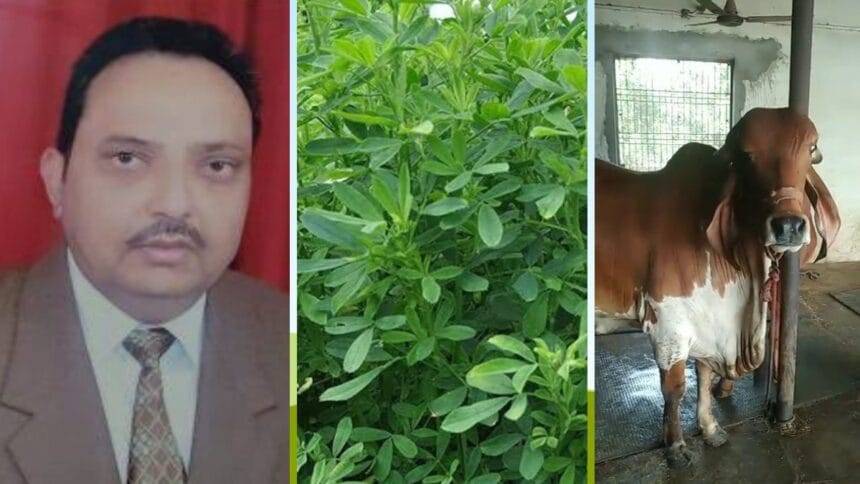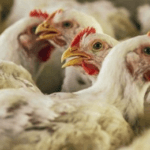Main Points In Hindi (मुख्य बातें – हिंदी में)
यहां पर दिए गए पाठ के मुख्य बिंदु निम्नलिखित हैं:
-
फसली स्थिति और स्वास्थ्य संबंधी चिंताएं: ग्रामीण क्षेत्रों में किसान मुख्यतः पशुपालन और खेती पर निर्भर करते हैं। हाल के मौसम में तेजी से परिवर्तन के कारण दूध से संबंधित जानवरों के स्वास्थ्य पर नकारात्मक प्रभाव पड़ सकता है, जिससे दूध उत्पादन में कमी आ सकती है।
-
बारसीम चारे का महत्व: डॉक्टर पीके उपाध्याय के अनुसार, बारसीम सर्दियों में पौष्टिक चारे का एक उत्कृष्ट स्रोत है, जिसमें उच्च प्रोटीन (20-22%) और उच्च पाचनशीलता (70-75%) होती है, जो मिल्क उत्पादन के लिए फायदेमंद है।
-
अधिक सेवन से सावधानी: हालांकि, अत्यधिक बारसीम खाने से जानवरों में दस्त हो सकता है। इसलिए, इसे सूखे चारे के साथ मिलाकर देना चाहिए या पहले सूखा चारा देना चाहिए और फिर बारसीम देना चाहिए।
-
स्वस्थ रखने के सुझाव: रात में तापमान में गिरावट को देखते हुए, जानवरों को 10 बजे के बाद शेड में बांधने और शेड को स्वच्छ और हवादार रखने की सलाह दी गई है। इसके अलावा, दिन में धूप में रखा जाना चाहिए ताकि जानवरों को गर्मी मिल सके।
- पोषण और देखभाल: पशुपालकों को गर्म पानी और पौष्टिक भोजन देने के लिए कहा गया है ताकि जानवरों का स्वास्थ्य मौसम के प्रभाव से सुरक्षित रहे। साथ ही, रात में ओस से बचाने के लिए सुरक्षित स्थान पर रखने की भी आवश्यकता है।
Main Points In English(मुख्य बातें – अंग्रेज़ी में)
Here are the main points of the provided text:


-
Impact of Weather on Animal Health: Farmers in rural areas are facing challenges due to rapid changes in weather, which can lead to diseases in milch animals and decreased milk production.
-
Nutritional Guidance on Barseem Fodder: Barseem is highlighted as a nutritious fodder for winter, containing high protein (20-22%) and good digestibility (70-75%). However, excessive feeding can cause dysentery in animals, so it should be mixed with dry fodder.
-
Feeding Strategies: To maximize the benefits of Barseem, farmers are advised to mix it with other seeds like oats, cabbage, and mustard for better nutritional value and to reduce digestive issues.
-
Shelter and Care Recommendations: Farmers are encouraged to provide clean and ventilated shelters for their animals, especially during cold nights, and ensure they receive hot water and nutritious food. Keeping animals in sunlight during the day is also recommended to maintain their health.
- Seasonal Management Advice: It is important for farmers to monitor their animals closely during seasonal changes and take necessary precautions to safeguard their health and productivity.
Complete News In Hindi(पूरी खबर – हिंदी में)
ग्रामीण क्षेत्रों में, किसान आमतौर पर अपनी आय के लिए कृषि के साथ-साथ पशुपालन पर निर्भर होते हैं। हाल के दिनों में मौसम में तेजी से बदलाव हुआ है, जिससे दूध देने वाले जानवर बीमार पड़ सकते हैं। तापमान में गिरावट और दिन और रात के बीच तापमान में अंतर से जानवरों की सेहत पर नकारात्मक प्रभाव पड़ सकता है, जिससे उनके दूध के उत्पादन में कमी आ सकती है। इस स्थिति में, पशुपालकों के लिए यह बेहद जरूरी है कि वे अपने जानवरों की सेहत पर विशेष ध्यान दें। इस संदर्भ में, चलिए विशेषज्ञों से जानते हैं कि इन बीमारियों से जानवरों की रक्षा के लिए क्या-क्या उपाय किए जा सकते हैं।
किसानों के लिए सलाह
इस बीच, डॉ. पीके उपाध्याय, प्रोफेसर, डेयरी और पशुपालन विज्ञान विभाग, चंद्रशेखर आजाद कृषि और प्रौद्योगिकी विश्वविद्यालय, कानपुर ने किसानों को सलाह देते हुए कहा कि बरसीम सर्दी के मौसम में पौष्टिक चारे का एक उत्कृष्ट स्रोत है। इसमें फाइबर की मात्रा कम होती है और औसत प्रोटीन 20 से 22 प्रतिशत होता है। इसका चारा 70 से 75 प्रतिशत पचने योग्य होता है। इसके अलावा, इसमें कैल्शियम और फास्फोरस की भी अच्छी मात्रा होती है, जिससे दूध देने वाले जानवरों को अलग से खाना देने की जरूरत कम होती है।
बरसीम चारे का अत्यधिक सेवन जानवरों के लिए हानिकारक है
उन्होंने कहा कि यह देखा गया है कि पहले कटाई में उपज कम होती है, लेकिन दूसरे और तीसरे कटाई में सबसे ज्यादा उपज होती है। बरसीम की अधिकता के कारण किसान अपने जानवरों को अधिक खिलाते हैं, जिससे नुकसान होता है। बहुत अधिक बरसीम खाने से जानवरों को दस्त हो सकता है। इसलिए, इसे सूखे चारे के साथ मिलाकर या पहले सूखा चारा खिलाकर बरसीम दें। यदि सर्दियों में बरसीम के बीजों के साथ ओट्स, गोभी और सरसों के बीज मिलाए जाएं, तो न केवल जानवरों को भरपूर हरा चारा मिलेगा, बल्कि उन्हें दस्त की समस्या से भी राहत मिलेगी और चारे का पोषण स्तर और पचने की क्षमता भी बढ़ेगी।
मौसम का जानवरों की सेहत पर प्रभाव
रात के समय तापमान में गिरावट को देखते हुए, डॉ. पीके उपाध्याय ने सुझाव दिया है कि जानवरों को रात 10 बजे के बाद शेड में बांधना चाहिए। शेड को साफ और हवादार रखना चाहिए ताकि जानवर ठंड से बच सकें। इसके साथ ही, उन्हें गर्म पानी और पौष्टिक खाना भी दिया जाना चाहिए, ताकि मौसम का उन पर खराब प्रभाव न पड़े। पशुपालकों को दिन के दौरान जानवरों को धूप में रखने की सलाह दी गई है, ताकि उनके शरीर को गर्मी मिल सके और उनकी सेहत में सुधार हो सके। रात में ओस से बचाने के लिए उन्हें सुरक्षित स्थान पर रखना भी जरूरी है।
यह भी पढ़ें-
उत्तर प्रदेश के कृषि मंत्री शाही ने खाद की कमी पर कहा – किसानों को अफवाहों पर ध्यान नहीं देना चाहिए, हेल्पलाइन नंबर जारी किया गया
Complete News In English(पूरी खबर – अंग्रेज़ी में)
In rural areas, farmers depend mostly on animal husbandry for their source of income along with farming. There has been a rapid change in the weather in the last few days, due to which milch animals may become victims of diseases. Due to drop in temperature and difference in temperature between day and night, the health of animals can be adversely affected, due to which their milk production can reduce. In this situation, it is necessary for animal farmers to pay special attention to the health of their animals. In such a situation, let us know from experts about some tips to protect animals from these diseases.
Advisory for farmers
Meanwhile, Dr. PK Upadhyay, Professor of the Department of Dairy and Animal Husbandry Sciences, Chandrashekhar Azad University of Agriculture and Technology, Kanpur, while issuing advisory to the farmers, said that Barseem is an excellent source of nutritious fodder during the winter season. The amount of fiber in it is less and the average amount of protein is 20 to 22 percent. The digestibility of its fodder is 70 to 75 percent. Apart from this, calcium and phosphorus are also found in large quantities in it, due to which there is less need to give separate cake and grains etc. to the milch animals.
Excessive consumption of Barseem fodder is harmful for animals.
He said that it has been observed that the yield is less during the first harvest, but the highest yield is obtained during the second and third harvest. Due to Barseem availability, farmers overfeed their animals and suffer losses. Eating too much Barseem causes dysentery in animals. Therefore, feed it by mixing it with dry fodder or feed dry fodder first and then Barseem. If oats, cabbage and mustard seeds are mixed with its seeds at the time of sowing of Barseem, then it will not only provide green fodder in large quantity. Rather, the animal will get relief from the problem of dysentery and the nutritional value and digestibility of the fodder will also increase.
Effect of weather on animal health?
In view of the drop in temperature at night, Dr PK Upadhyay has suggested that animals should be tied in sheds after 10 pm. The shed should be clean and ventilated so that the animals can escape from the cold. Also, they have been advised to provide hot water and nutritious food, so that their health is not affected by the weather. Animal farmers have been advised to keep the animals in sunlight during the day, so that their bodies get warmth and their health can improve. At the same time, it is important to keep them in a safe place to protect them from dew at night.
Read this also-
UP Agriculture Minister Shahi said on the shortage of fertilizers – Farmers should not pay attention to rumours, helpline number released










